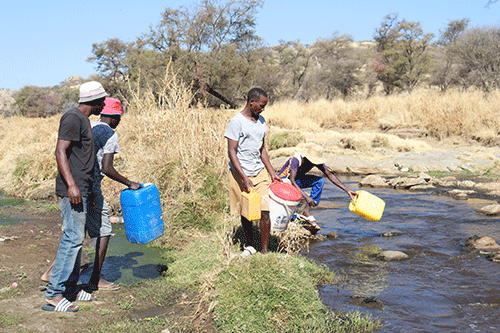Although the Khomas Regional Council made efforts to save the residents from drinking sewer water by paying for water tokens at the City Of Windhoek, the municipality said they will not issue the tokens to all the residents, as some do not qualify to get them.
The city’s acting CEO Faniel Maanda recently told New Era that although he acknowledged the payment of 100 tokens, not all the registered residents will receive the token to access potable water.
More than 120 residents of the Hadino Hishongwa location in the mountainous area behind Goreangab in the Samora Machel constituency are forced to drink wastewater that is not fit for human consumption.
This is due to the lack of water points and the area’s unaffordable prepaid cards (water tokens). The disgruntled community members also say they are now “victims of the City of Windhoek’s failure”.
They draw water from a river that flows from the Goreangab sewage dam, but they also fear for their safety, as they are trespassing on private land.
To compound their fear, Samuel Jusias, a community leader, told New Era the residents’ health is at stake, as they always have stomach problems because they drink and cook with contaminated water.
Maanda, however, did not buy the story of the residents drawing water from the river bed, questioning why the residents only have to drink sewer water now after the free water that was provided during Covid-19 got cut.
“When the water was free, those people were able to access water no matter how far the water point was. And now you can ask yourself a question why only now after free water was cut,” he explained.
He added the city controls the land grabbing, based on the resolution it has zero tolerance for the land invasion to upgrade the informal settlement.
Maanda said those people who are drawing water in river beds will not be issued with prepaid cards because they are not recognised by the city.
“Those who are recognised are issued with a certificate of occupation that is accompanied by the water token. If you do not have a water token, that means you came there on your own, or [you are] a land grabber,” he explained.
He said the list submitted by the regional council has to be vetted through the system in place.
The community includes 46 families, who were placed there by the City of Windhoek on 28 December 2021.
They explained although the majority had been living there for the past six to seven years, they were lucky that during Covid-19, there was free water for them.
“Now that Covid-19 is no longer there, the City of Windhoek decided to close the tap and made it mandatory that only those with water tokens can fetch water. We have tried our level best to apply for the cards; however, they have changed the requirements,” said one of the residents, Gideon Kristo.
The residents said although the tap is approximately 800 metres away, they would try to go fetch water as was the case in the past – but now, they do not meet the requirements of getting the water tokens.
One of the requirements that prevent the majority from getting the tokens is the erf number issue.
“They put that requirement and forget that they did not give the people they brought here erf numbers. Now we are here suffering. The City of Windhoek failed dismally to allocate numbers on time when they had that operation two years back. But now we are the victims of their failure,” said another resident who did not want to be named.
However, Maanda said only the households with certificates of occupation will receive tokens for water.
“Those people came there on their own and that area was surveyed and all people who were present during that process were recognised and were qualified for water tokens. Hence, only 46 households out of the over 100 names submitted by the regional council will receive the tokens,” said Maanda.
He added the money paid will be in the city account until the intended residents get recognised and approved by the system to receive the water tokens.


